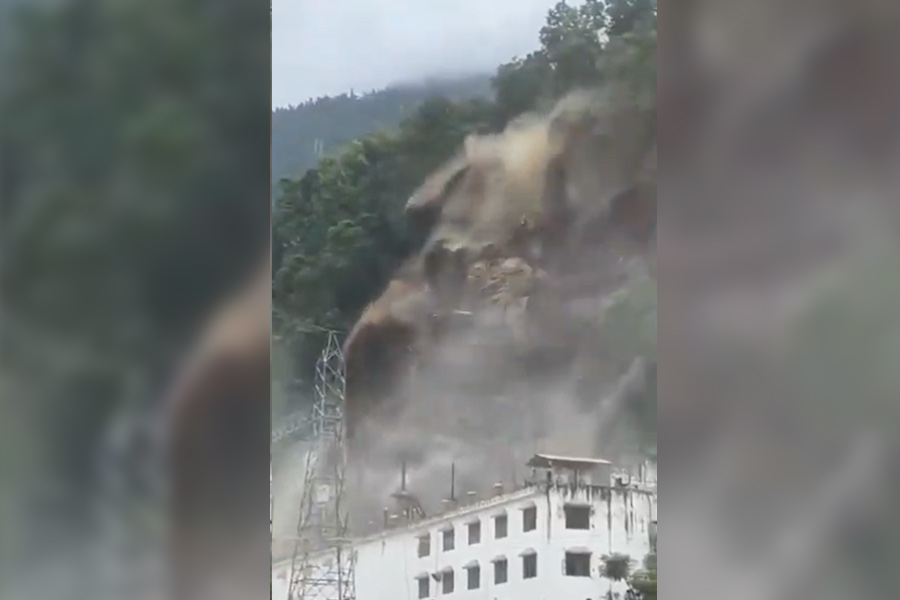In the wake of landslides in Sikkim, the Congress on Wednesday hit out at the government and said hydel projects in ecologically fragile regions have been coming up over the past few years without giving adequate thought to their cumulative environmental impact.
The Opposition party also asserted that dams on the Teesta river are the prime example of how ecology is being fundamentally altered with grave consequences for this and future generations.
A massive landslide struck east Sikkim on Tuesday, damaging parts of a 510-mw hydroelectric project on the Teesta river.
The landslide happened at Dipu Dara near Singtam in Gangtok district around 7.30 am, causing significant damage to the powerhouse of the Teesta Stage V hydroelectric project of the NHPC.
In a statement, Congress general secretary in-charge communications Jairam Ramesh said a series of landslide disasters in Sikkim has substantially damaged the Teesta V, a 510 MW hydel power station on the Teesta.
This disaster comes on the heels of the Glacial Lake Outburst Floods (GLOF) and riverine floods in the Teesta River basin in October 2023, which caused massive devastation in Sikkim and Kalimpong, West Bengal, he noted.
The Union Budget, unveiled in July 2024, had a section dedicated to 'Irrigation and Flood Mitigation,' where Finance Minister Nirmala Sitharaman made the vague promise of "assistance" without any details of funds for Sikkim, he said.
"In a classic case of the Government's confrontational federalism, the Budget was indifferent to the areas in West Bengal which were equally affected," Ramesh said.
"The obvious vendetta politics aside, the Budget announcements were insufficient - what the entire region needs is for a development framework that centres ecological dimensions, the case for which has become apparent from the cascading series of disasters in the last year," the former environment minister argued.
National Highway 10, the lifeline of Sikkim and Kalimpong, runs along the Teesta and has been in a precarious state with frequent landslides and closures, he pointed out.
As of today, the NH has been closed for over a month, severely affecting trade, tourism, and more importantly, the security of these sensitive border areas of India, he said, adding these floods are an economic, social, and political disaster for these regions.
These natural disasters, like the October 2023 catastrophe and the recent landslides, have become commonplace due to ecological destruction and unplanned constructions, Ramesh said.
A spate of hydro projects on the Teesta River has caused the river to become more flood-prone, washing away sections of the NH10, the Congress general secretary said.
As per the National Hydropower Development Corporation (NHDC), 47 hydropower projects are in different stages of development on the Teesta River in Sikkim and West Bengal, he noted.
Of them, nine have been commissioned, work on 15 dams is going on and another 28 are in the pipeline, Ramesh said.
The October 2023 disaster was provoked by the GLOF, but it only reached its catastrophic scales due to the failure of the Teesta-III dam, the Congress leader said.
Amidst these hydel projects, IRCON has also undertaken tunnelling of this sensitive region for the Sivok-Rangpo railway line (14 tunnels), contributing to the region's increased vulnerability, Ramesh said.
"The mismanagement in the debris disposal has also resulted in the riverbed level going up, making the region more flood prone," he said in his statement.
Aside from this environmental catastrophe in the making, these projects have also been undertaken without local communities in mind, Ramesh argued.
The people of Sikkim and Kalimpong have not gained from the hydro projects in terms of employment, share in power, or revenue generation, he said.
No consultative process was undertaken with the local communities in advance of the railway line projects, he added.
Ramesh further said that the recent experience has shown that this lack of consultation was a shortsighted decision. The authorities had dismissed members of the local Lepcha community when they challenged the Teesta V project's environment clearance in 2014, including on the grounds of the absence of studies on the potential impact of GLOFs on the project.
"True to their warnings, the GLOF overtopped the Teesta V dam as well, causing damage to the project back in October. A few months later, landslides have now struck the same dam," he said.
Hydel projects in ecologically fragile regions have been coming up over the past few years without giving adequate thought to their cumulative environmental impacts, Ramesh stressed.
"Dams on the Teesta are the prime, but not the only, example of how - in the name of development - ecology is being fundamentally altered, with grave consequences for this and future generations," the Congress leader said.
Except for the headline, this story has not been edited by The Telegraph Online staff and has been published from a syndicated feed.










